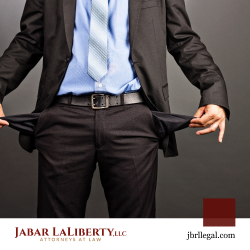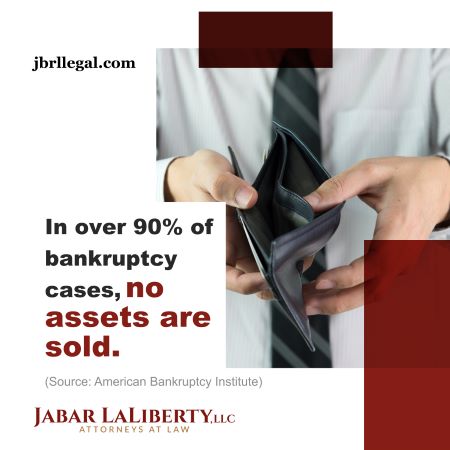Maine Bankruptcy Lawyers
Our attorneys can help you improve your financial situation
Everyone has bills to pay, but sometimes, debt can spiral out of control and become an overwhelming financial burden. Bankruptcy offers you a chance to start over. There are different types, however, each with their own eligibility requirements. The experienced bankruptcy lawyers at Jabar LaLiberty, LLC can guide you through the process step by step.
Our firm has been helping people in Waterville, Portland and throughout Maine with bankruptcy and other cases since our founding in 1979. We know the impact that bankruptcy can have on people and their families. We’re dedicated to helping you get the best possible outcome. It’s one reason we’ve earned a reputation as lawyers that Mainers trust.
Why do people file bankruptcy?
Common types of debt include mortgages, credit cards, car loans, student loans and medical expenses. People fall behind on their payments for many reasons. Some are beyond their control. For example, they lose their job or are faced with a large and unexpected expense. Sometimes, it’s because of poor money management. Or it can be a combination of factors.
Whatever the reason, once debt does get out of control, they are in a very difficult financial situation. Excessive debt can harm your credit rating and make it difficult to get a loan or buy a house. Debt makes it harder to save for retirement. The stress of debt can also take a toll on your emotional health and on relationships.
What are the different types of bankruptcy?
Fortunately, the law provides individuals with remedies to help them settle their debts, so they can move forward with their lives. The types of bankruptcy available to individuals include:
Chapter 7 bankruptcy
 Chapter 7 is a type of bankruptcy designed to give people a fresh start. Also known as liquidation bankruptcy or “straight bankruptcy,” filing Chapter 7 bankruptcy will discharge (wipe out) your eligible debts. The downside is that you have to liquidate certain assets, and it’s not always a great option if you have secured debt like a mortgage or auto loan. Chapter 7 bankruptcy is the more common form of personal bankruptcy, but not everyone is eligible to file.
Chapter 7 is a type of bankruptcy designed to give people a fresh start. Also known as liquidation bankruptcy or “straight bankruptcy,” filing Chapter 7 bankruptcy will discharge (wipe out) your eligible debts. The downside is that you have to liquidate certain assets, and it’s not always a great option if you have secured debt like a mortgage or auto loan. Chapter 7 bankruptcy is the more common form of personal bankruptcy, but not everyone is eligible to file.
Who qualifies for chapter 7 bankruptcy?
To file Chapter 7, you need to meet certain requirements including:
- Completion of a credit counseling course from an approved agency, 180 days before filing.
- Not having filed Chapter 7 bankruptcy for the past 8 years
- Not having filed Chapter 13 bankruptcy for the past 6 years
- If you have previously filed and your case was dismissed, you must wait at least 181 days before trying again.
- Your average monthly income for the last 6 months is less than the median income for a household of the same size in your state.
If you don’t meet the requirements to file for Chapter 7 bankruptcy, you may be able to file for Chapter 13.
Does Chapter 7 stop collection action?
When you file for Chapter 7, you will be protected by the “automatic stay,” a court order that blocks collection actions like foreclosure, repossession, and so on. Your creditors can’t come after you while your bankruptcy is pending.
What debts can be discharged?
Chapter 7 bankruptcy is used to wipe out unsecured debts including:
 Credit card debt
Credit card debt- Medical debt
- Utility bills
- Personal loans
- Back rent
You can also discharge secured debts in Chapter 7 (such as auto loans), but you have to give up the associated property. If you need to keep the property, it may be possible to qualify for an exemption or “reaffirm” the debt. These are situations you can discuss with an experienced attorney.
Make sure to include all wanted discharged debts while filing for chapter 7 bankruptcy. It is crucial you don’t forget to leave anything out. If you do leave out a loan or other debt, you're giving a creditor the opportunity to pursue you for those debts.
Get a clean slate with a Chapter 7 discharge
After filing and working through your case, you will receive your discharge. You are now no longer liable for the qualified unsecured debts included in your file. Once discharged, the creditor you used to owe cannot try to collect from you. Although the Chapter 7 bankruptcy will show up on your credit report, you have a clean slate to start rebuilding your credit.
Chapter 13
Also sometimes known as “wage earner” bankruptcy, Chapter 13 is designed to provide people with time to pay their creditors and taxes while allowing them to hold on to their assets. Under this plan, debt can be consolidated and reorganized. Then, a reasonable payment plan is created to pay off the debt over three to five years. Chapter 13 can often allow you to keep your home if you are facing foreclosure.
Who qualifies for chapter 13 bankruptcy?
To qualify for Chapter 13, you must:
- Have a steady income sufficient to keep up with a payment plan.
- Have proof of filing federal and state income tax returns for the 4 previous years before you filed for bankruptcy.
- Not have filed Chapter 13 for two years or Chapter 7 for four years.
- Have total debt below a certain threshold.
If you don’t meet the income requirements or have debt over the maximum limit, another type of bankruptcy may be more suited for you.
What debts are covered in Chapter 13?
The debts Chapter 13 bankruptcy covers are significantly broader than Chapter 7, but most of your debt isn’t discharged. Instead, your debts are rolled into a repayment plan, and anything left when you complete the three- to five-year repayment plan is discharged.
Here’s how the Chapter 13 process works:
- If you are thinking about filing for chapter 13 bankruptcy, contacting an attorney should be your first step. We can help you file if that is the best option for you and help you decide if Chapter 13 or another type of bankruptcy is best for you.
- Before you file any paperwork, you must complete an approved credit counseling course. After completion, you’re all set to file. You’ll need to turn over documents like tax returns, pay stubs, and W-2 forms for your hearing.
- When you file, the court will issue an “automatic stay,” which blocks collection actions like repossession, foreclosure, or wage garnishment. Chapter 13 also includes a “codebtor stay” which temporarily protects your co-signers and joint debt holders.
- You should have your payment plan set 14 days after filing. Within 30 days of filing, you’ll begin repayment, usually biweekly or monthly across a 3- to 5-year span.
- The court must approve the repayment plan. An attorney can fight any objections in court.
If your income decreases or is entirely lost while you are repaying, you may be able to reduce payments. You can also convert to Chapter 7 or dismiss your Chapter 13 bankruptcy case completely. An experienced lawyer can discuss your options and help you decide the best route for you.
Do I need a lawyer to file bankruptcy In Maine?
There are pros and cons to every type of bankruptcy. One of our attorneys can help you determine what types of bankruptcy you are eligible to file for and what you can expect. Filing for bankruptcy is a major decision. We can help you understand how it will affect your life and help you create a plan to improve your current financial situation. We understand the procedures used in the United States Bankruptcy Court for the District of Maine, and we have a strong track record of results for Mainers dealing with overwhelming debt.
Learn more about how we can help. Contact us to schedule a consultation at either our Waterville or Portland office. One of our bankruptcy attorneys can review your finances and advise you of your options. We can also answer any questions that you have.
